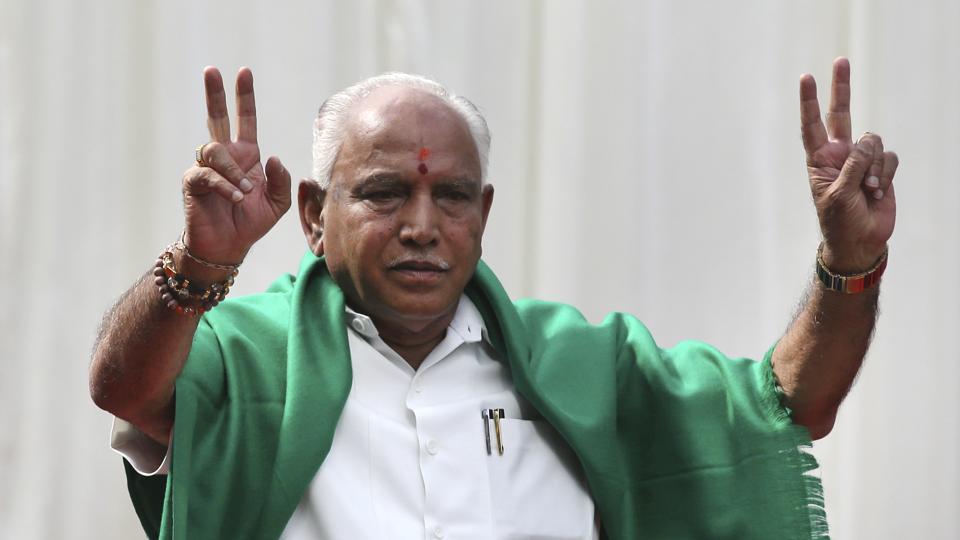BJP avoids Karnataka floor test
May 19, 2018 | Expert Insights

Minutes before the floor test to prove his party’s majority in the state of Karnataka, BJP leader B.S. Yeddyurappa resigned as Chief Minister. The BJP had been asked to prove their majority after emerging as the single largest winner of the state elections, securing 104 out of the 222 assembly seats in a highly polarized campaign.
Background
The southern Indian state of Karnataka took its present shape in 1956, after the states of Mysore and Coorg (Kodagu) merged with the Kannada-speaking districts of the former states of Bombay and Hyderabad, and Madras. The first ever assembly election in Karnataka was held in 1952 and it resulted in a victory for the Indian National Congress. K. Chengalaraya Reddy became the first ever chief minister of the state.
The Government of Karnataka is a democratically elected body with the governor as the constitutional head. The governor is appointed for five years and appoints the chief minister and his council of ministers, who are democratically elected in Legislative Assembly elections once every five years. The governor remains the head of the state, but the day-to-day functioning is undertaken by the chief minister and his council of ministers. There are 224 seats in the Karnataka Legislative Assembly. For a party to declare majority and form a government, it has to win at least 113 seats either by itself or through a coalition.
The politics of Karnataka is dominated by three major political parties, the Indian National Congress, the Janata Dal (Secular), and the Bharatiya Janata Party (BJP). Siddaramaiah (Indian National Congress), B. S. Yeddyurappa (Bharatiya Janata Party) and H. D. Kumaraswamy (Janata Dal (Secular)) were the leading candidates to become the next Chief Minister of the state in 2018.
The 2018 Karnataka elections were extremely contentious, with the Indian Prime Minister Narendra Modi himself campaigning for the BJP. The southern state registered a voter turnout of over 72% on May 12th. The results were announced on 15th May, with BJP emerging as the single largest party in the state with 104 seats in the Assembly. As the election results were declared, the Congress reached out to former Prime Minister Deve Gowda’s JD(S) to keep the BJP out of power in Karnataka. The two parties, who had secured 78 and 38 seats respectively, agreed to form a coalition.
Analysis
The leaders from the BJP and JD(S) independently met Karnataka Governor Vajubhai Vala to stake their claim of forming the government. As the single largest party in the state, the Governor granted the BJP the opportunity to prove they had a majority. B.S. Yeddyurappa was sworn in as the Chief Minister of Karnataka and Governor Vala gave the BJP a period of 15 days to prove its strength with a floor test.
However, after an appeal was filed by the Congress and JD(S), the Supreme Court reduced the period required for a floor test, ordering a floor test the day after the hearing. A floor test is a trust vote to know whether the executive head of the state has the confidence of the legislature. After the announcement, there were fears that Congress or JD(S) MLAs would be poached by the BJP. There were a number of unverified accusations that attempts were made to bribe MLAs.
The trust vote was therefore scheduled to take place at 4 p.m. on May 19th, 2018. However, before the vote could commence, the newly-sworn in Chief Minister B.S. Yeddyurappa resigned. “I will lose nothing if I lose power, my life is for the people,” he said in an emotional speech, before continuing, “I am not moving this motion. I will go straight away to Raj Bhavan and submit my resignation.”
Congress leaders celebrated their victory. “Democracy has finally won the battle against the unholy politics of intimidation, corruption and lies," the Congress tweeted. "Congratulations Karnataka!" Former CM Siddaramaiah tweeted, "Conspiracy by BJP fails. Their attempts to indulge in anti-constitutional activities have failed." JD(S) leader Kumaraswamy said that the coalition would wait for an invitation from the governor to begin forming the state.
Meanwhile, the BJP said that the proceedings demonstrate that their party respects democracy. “Today Yeddyurappa has taught the world how to respect democracy. He has touched the people,’ Union Minister Prakash Javadekar said in a press conference, reiterating that BJP had made major gains in the state.
Assessment
Our assessment is that the Supreme Court intervention to bring forward the trust vote seemed to be a fair and unbiased decision. The Judiciary stepped up to fulfil its role as the protector of democracy. We believe that after Yeddyurappa’s resignation, JD(S) leader H.D. Kumaraswamy is most likely to become the next Chief Minister of Karnataka. The Deputy Chief Minister may be a member of the Congress party.
Read more: Karnataka elections 2018 – Verdict is out








Comments